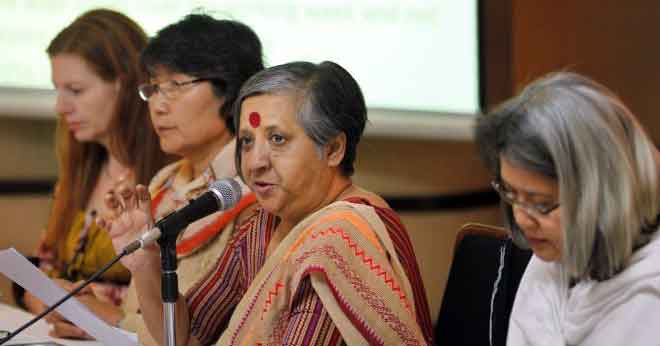Dr Fahmida Khatun on RMG wage allocation in supply chain and workers’ capacity building, published in The Daily Star on Thursday, 31 October 2013.
Trade unionism a must: analysts
Star Business Report

Rights activists and labour leaders yesterday called for trade unions at all garment factories to give the workers a platform to ensure their rights.
They also favoured a system of determining the minimum wages for garments workers by considering the cost of living, and not just by taking food inflation into account.
Their pleas came at a national consultation with the United Nations mandate holders on women in the readymade garments sector in Bangladesh at BRAC Centre Inn in Dhaka.
The discussion was organised by Asia Pacific Forum on Women, Law and Development; Ain o Salish Kendra and Nijera Kori.
“The existence of trade unions is vital to fight to ensure workers’ rights,” said Heisoo Shin, a member of the UN Committee on Economic, Social and Cultural Rights.
Manufacturers should set minimum wages by following international standards under International Labour Organisation, Shin said. Increasing the buying power of garment workers will benefit the whole economy, she added.
“It will be unwise to fix the minimum wages by considering inflation. Factors such as the cost of education, health and others should also be taken into account,” said Khushi Kabir, coordinator of Nijera Kori.
Owners should ensure a minimum standard of living for the workers to increase their productivity and develop the sector, Kabir added.
“There is no alternative to trade unions to benefit the workers,” said Zafrul Hasan, secretary general of Jatiyabadi Sramik Dal, labour wing of main opposition BNP.
The government should fix minimum wages in such a manner that the interest of both workers and owners are preserved, Hasan said. The government should set a minimum basic of Tk 8,000 as wages considering their living costs, he said.
Garment workers, who are mostly women, receive one of the lowest minimum wages among the major industrial sectors in Bangladesh, said Shaheen Anam, executive director of Manusher Jonno Foundation.
It is also the lowest among Bangladesh’s competing countries in Asia compared to Vietnam, China and Pakistan, she said.
The owners should give minimum wages to the workers, which will give social recognition to live in society, she added.
“We have cheap labour and so we should go for collective bargain with the international buyers to develop the recent scenario of the garments sector.”
International retailers want to give low prices to their consumers and therefore, they are not concerned about the minimum wage for garment workers, said Fahmida Khatun, research director and head of research of Centre for Policy Dialogue.
She suggested increasing the allocation for wages in the supply chain process.
She said 50 percent of the garment factories in Bangladesh go for subcontracting, which are not fully compliant. The owners should train workers to increase their efficiency and develop the working environment to increase productivity, she added.
The high productivity of workers will ensure high wages for the workers, she said.
Rights Activist Sultana Kamal said a mutual sense of accountability is needed between workers and manufacturers to develop the sector. The owners should give living wages instead of minimum wages to the workers, said Kamal, who is also a former adviser to the caretaker government.
The owners are taking facilities from the government through public money, and so they have a responsibility to the workers, she added. “It is a crime and also illogical that owners do not want to give standard wages to the workers.”
Their unwillingness will hurt the whole garments industry in future, she said.

